Reading Proust's In Search of Lost Time in 2014 discussion

This topic is about
The Guermantes Way
The Guermantes Way
>
Week ending 05/31: The Guermantes Way, to page 450 / location 23030
message 1:
by
Renato
(last edited May 11, 2014 09:29AM)
(new)
-
rated it 5 stars
May 11, 2014 08:49AM
 Mod
Mod
reply
|
flag
 I'm as confused as the narrator right now. What exactly IS a 'renter'? As in:
I'm as confused as the narrator right now. What exactly IS a 'renter'? As in:"At any rate he is a man, not one of those effeminate creatures one sees so many of nowadays, who look like little renters, and at any moment may bring their innocent victims to the gallows."
Sunny in Wonderland wrote: "I'm as confused as the narrator right now. What exactly IS a 'renter'? As in:
"At any rate he is a man, not one of those effeminate creatures one sees so many of nowadays, who look like little r..."
I just checked my Penguin edition and a library copy of the Vintage edition and both use the more modern term 'rent boy'. In full the Penguin version is:
"At any rate he is a man, not one of those effeminate creatures one sees so many of nowadays, who look like little r..."
I just checked my Penguin edition and a library copy of the Vintage edition and both use the more modern term 'rent boy'. In full the Penguin version is:
At least he's a proper man, not one of those effeminate creatures one comes across everywhere nowadays, who look just like rent boys capable of bringing their innocent victims to a sorry end at the drop of a hat.
 Maybe it's a British term? I still don't quite understand what a rent boy is. Is that like a courier - someone who delivers letters?
Maybe it's a British term? I still don't quite understand what a rent boy is. Is that like a courier - someone who delivers letters?Um, LOL! Nevermind. Google was able to tell me what a rent boy is. :) Thank you, Jonathan!
 If you let me know in what section is that expression, I'll check in the French version and try to find what a "rent boy" would be in French. My feeling is that it might be someone you would pay for particular services...
If you let me know in what section is that expression, I'll check in the French version and try to find what a "rent boy" would be in French. My feeling is that it might be someone you would pay for particular services...
 Based on Google, I think you're right on track. I don't know how to convey the section it is in other than that it was part of the reading for week ending May 31st. But, it was during the conversation that the narrator had with de Charlus after his visit with Mme. Villeparisis and crew.
Based on Google, I think you're right on track. I don't know how to convey the section it is in other than that it was part of the reading for week ending May 31st. But, it was during the conversation that the narrator had with de Charlus after his visit with Mme. Villeparisis and crew.
 Sunny in Wonderland wrote: "Based on Google, I think you're right on track. I don't know how to convey the section it is in other than that it was part of the reading for week ending May 31st. But, it was during the convers..."
Sunny in Wonderland wrote: "Based on Google, I think you're right on track. I don't know how to convey the section it is in other than that it was part of the reading for week ending May 31st. But, it was during the convers..."Okay, I found it! Proust uses the expression "petit truqueur" which, in the language of that time meant a male prostitute or rent boy.
Speaking of the conversation that the narrator had with de Charlus: why was he so interested on the narrator? Where is all that coming from? I'm curious to find out what his intentions are... I got the feeling that de Charlus has naughty interests on him... could that be or am I taking things too far?
Some painters - not specific paintings - were mentioned in this week's reading.
1) Like Legrandin, M. de Norpois and the Prince von Faffenheim critique Mme. de Villeparis's painting:
Some examples of Fantin-Latour's flower paintings:
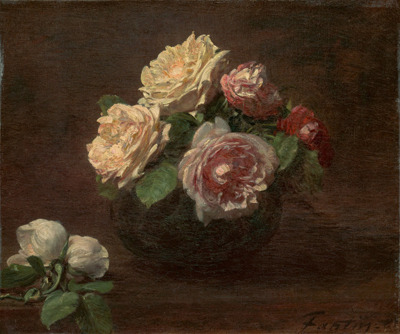
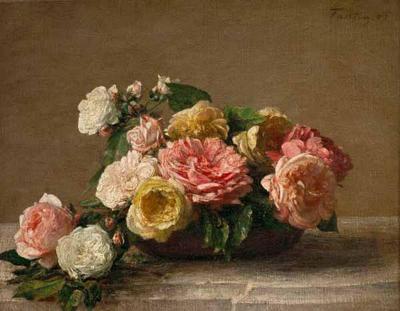
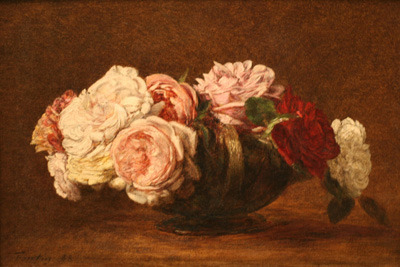
2) While thinking about how he found Bergotte's books to be less inspiring and comparing him to a new writer whose sentences he struggled to understand:
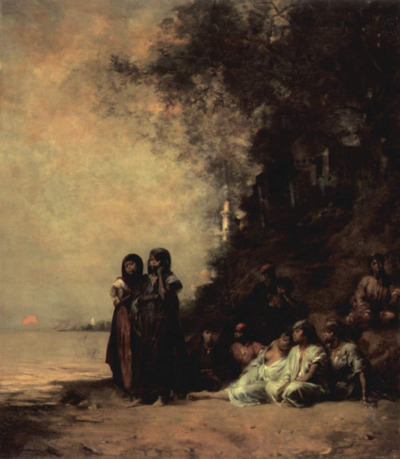
Egyptian Women on the Edge of the Nile, Eugène Fromentin
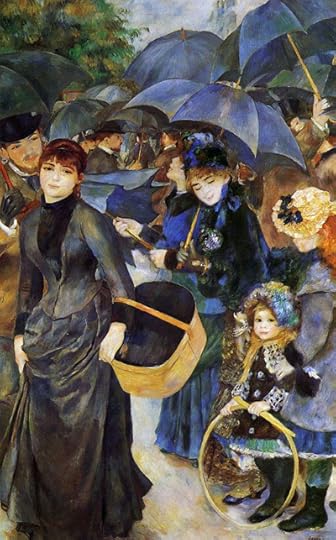
Les Parapluies, Pierre-Auguste Renoir
3) "As he continues to contemplate Bergotte's books, the Narrator formulates an understanding of the importance that new developments in art provide in refreshing and revitalizing our view of the world:" (excerpt from Paintings in Proust)

La Balançoire, Pierre-Auguste Renoir
1) Like Legrandin, M. de Norpois and the Prince von Faffenheim critique Mme. de Villeparis's painting:
And he asked her whether she had seen the flower paintings by Fantin-Latour which had recently been exhibited.
"They are first class, the work, as they say nowadays, of a fine painter, one of the masters of the palette", declared M. de Norpois. "Nevertheless, in my opinion, they cannot stand comparison with those of Mme. de Villeparisi, which give a better idea of the colouring of the flower".
Some examples of Fantin-Latour's flower paintings:



2) While thinking about how he found Bergotte's books to be less inspiring and comparing him to a new writer whose sentences he struggled to understand:
There was a time when people recognized things quite easily when it was Fromentin who had painted them, and could not recognize them at all when it was Renoir.

Egyptian Women on the Edge of the Nile, Eugène Fromentin

Les Parapluies, Pierre-Auguste Renoir
3) "As he continues to contemplate Bergotte's books, the Narrator formulates an understanding of the importance that new developments in art provide in refreshing and revitalizing our view of the world:" (excerpt from Paintings in Proust)
People of taste and refinement tell us nowadays that Renoir is one of the great painters of the last century. But in so saying they forget the element of Time, and that it took a great deal of time, well into the present century, before Renoir was hailed as a great artist. To succeed thus in gaining recognition, the ori- ginal painter, the original writer proceeds on the lines adopted by oculists. The course of treatment they give us by their paint- ing or by their prose is not always agreeable to us. When it is at an end the operator says to us: "Now look!" And, lo and be- hold, the world around us (which was not created once and for all, but is created afresh as often as an original artist is born) appears to us entirely different from the; old world, but per- fectly clear. Women pass in the street, different from what they used to be, because they are Renoirs, those Renoir types which we persistently refused to see as women. The carriages, too, are Renoirs, and the water, and the sky: we feel tempted to go for a walk in the forest which reminds us of that other which when we first saw it looked like anything in the world except a forest, like for instance a tapestry of innumerable shades but lacking precisely the shades proper to forests. Such is the new and perishable universe which has just been created. It will last until the next geological catastrophe is precipitated by a new painter or writer of original talent.

La Balançoire, Pierre-Auguste Renoir
The section about his grandmother's illness really touched me.
I could picture the despair he was in when he sat her down and went after Professor E-- to try and make him to check on her.
I particularly got chills when he mentioned the moments where his mother went down the stairs, to the hall, to see her mother, how she "kissed her hand as though it were that of her God", and how she never once raised her eyes or looked at the sufferer's face:
So far, this is one of my favorite's sections on In Search Of Lost Time.
I know this is a horrible thing to say, but I'm looking forward to her death so I can read how the narrator dealt with it and how Proust wrote about it: mainly for death being one of the subjects that interests me the most, and Proust being an author who has left me speechless lots of times already because of how he words his feelings and ideas.
I forgot if it was mentioned before: has his grandfather already passed away or is he still alive?
I could picture the despair he was in when he sat her down and went after Professor E-- to try and make him to check on her.
I particularly got chills when he mentioned the moments where his mother went down the stairs, to the hall, to see her mother, how she "kissed her hand as though it were that of her God", and how she never once raised her eyes or looked at the sufferer's face:
Perhaps this was in order that my grandmother might not be saddened by the thought that the sight of her could alarm her daughter. Perhaps from fear of a grief so piercing that she dared not face it. Perhaps from reverence, because she did not feel it permissible to herself, without impiety, to remark the trace of any mental weakening on those venerated features. Perhaps to be better able to preserve intact in her memory the image of the true face of my grandmother, radiant with wisdom and goodness. So they went up side by side, my grandmother half hidden by her shawl, my mother turning away her eyes.
So far, this is one of my favorite's sections on In Search Of Lost Time.
I know this is a horrible thing to say, but I'm looking forward to her death so I can read how the narrator dealt with it and how Proust wrote about it: mainly for death being one of the subjects that interests me the most, and Proust being an author who has left me speechless lots of times already because of how he words his feelings and ideas.
I forgot if it was mentioned before: has his grandfather already passed away or is he still alive?
 Renato wrote: "The section about his grandmother's illness really touched me.
Renato wrote: "The section about his grandmother's illness really touched me."I know this is a horrible thing to say, but I'm looking forward to her death so I can read how the narrator dealt with it and how Proust wrote about it:..."
Not horrible at all.
Hum...let's see how the narrator reacts.
Time will tell.
 Renato wrote: "Some painters - not specific paintings - were mentioned in this week's reading.
Renato wrote: "Some painters - not specific paintings - were mentioned in this week's reading.1) Like Legrandin, M. de Norpois and the Prince von Faffenheim critique Mme. de Villeparis's painting.."
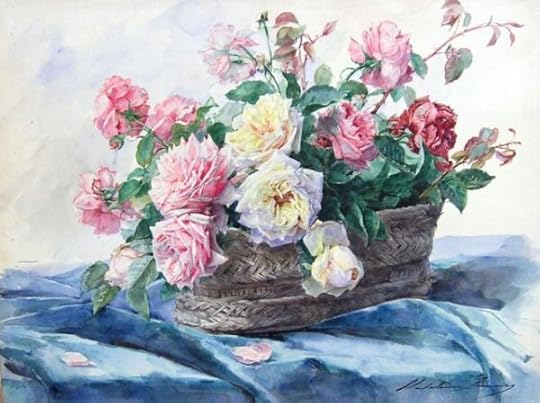
Like Mme Villeparis, Proust's dear friend and collaborator, Madeleine Lemaire (1845–1928) painted flowers, especially roses, in watercolors.
At No. 31 rue de Monceau, every Tuesday, she held brilliant receptions. She was also one of the models for Mme Verdurin.
Robert de Montesquiou: “The Empress of the Roses”
Proust: "C’est elle qui a crée le plus de roses après Dieu".
http://librairie-loliee.blogspot.com/...

Madeleine Lamaire by Nadar
"On Monday morning, May 11, Le Figaro published Proust's latest society piece:
'La Cour aux lilas et l' atelier des roses: Le Salon de Mme Madeleine Lemaire'
(The lilac courtyard and the studio of the roses: The studio of Mme Madeleine Lemaire)."
'Dominique,' as Proust had signed the article, began with a page-long parody of Balzac, describing Lemaire's neighborhood and the small house..."
http://books.google.com/books?id=aYaT...
Marcel Proust: A Life, with a New Preface by the Author
William C. Carter - 2013
"The Lilac Courtyard and the Studio of Roses
The Salon of Mme Madeleine Lemaire"
"Had Balzac been living today he may have begun one of his novels in this way:
'Those who, in order to proceed from the avenue de Messine to the rue de Courcelles or the boulevard Haussmann, take the street called Monceau, named after one of the greatest noblemen from the ancien régime whose private parks have become our public gardens,...'
'All Paris wanted to gain admittance to the studio but never succeeded in gaining entry at the first attempt.
'...here are the guests as they successively arrive: ...the Italian, German and Russian ambassadors, countess Greffulhe, M. Gaston Calmette, the grand-duchess Vladimir, countess Adhéaume de Chevigné, ... M. Anatole France, M. Jules Lemaître, count and countess d'Haussonville, countess Edmond de Pourtalès, MM. Robert de Flers and Gaston de Caillavet, brilliant authors of the triumphal Vergy, with their lovely wives; M. Vandal, M. Henri Rochefort, M. Frederic de Madrazzo, countess Jean de Castellane, ..., the duchess Grazioli, count and countess Boni de Castellane.'"
Translation by Chris Taylor
http://www.yorktaylors.free-online.co...
"Madeleine Lemaire wore big hats to hide her acne and trains on her dresses to hide the size of her feet. ... She knew the exact circumstances of everyone, the debts and the expectations, the liaisons and the quarrels."
The Melodies of Reynaldo Hahn
By Thea Sikora Engelson
http://books.google.com/books?id=4z7d...
Marcelita wrote: "Not horrible at all.
Hum...let's see how the narrator reacts.
Time will tell. "
Ha ha, oh the suspense!!!
---
Thanks for the material on Madeleine Lemaire! Great stuff! I'm planning to read William C. Carter's book when I finish Time Regained.
Hum...let's see how the narrator reacts.
Time will tell. "
Ha ha, oh the suspense!!!
---
Thanks for the material on Madeleine Lemaire! Great stuff! I'm planning to read William C. Carter's book when I finish Time Regained.
 Renato wrote: "Speaking of the conversation that the narrator had with de Charlus: why was he so interested on the narrator? Where is all that coming from? I'm curious to find out what his intentions are... I got..."
Renato wrote: "Speaking of the conversation that the narrator had with de Charlus: why was he so interested on the narrator? Where is all that coming from? I'm curious to find out what his intentions are... I got..."His intentions are predatory Renato. Did everyone pick up on the fact that as Charlus lead our hero arm-in-arm along the streets of Paris looking for "just the right cab" that in fact he was cruising for "just the right cabman" with which to have "rent-boy" sex? Ultimately, he finds "just the right cab", cabman half-drunk and driving from inside the cab. Charlus bids our hero adeiu, puts up the hood of the cab, takes the reins from the cabman and drives off into the darkness. Our hero remains clueless, but won't remain so much longer.
Ok, so I wasn't reading too much into it! And yes, I also imagined that Charlus was cruising for sex while looking for "just the right cabman", but since sometimes I think I'm too malicious and see things when there aren't, I didn't mention it.
 Renato wrote: "Ok, so I wasn't reading too much into it! And yes, I also imagined that Charlus was cruising for sex while looking for "just the right cabman", but since sometimes I think I'm too malicious and see..."
Renato wrote: "Ok, so I wasn't reading too much into it! And yes, I also imagined that Charlus was cruising for sex while looking for "just the right cabman", but since sometimes I think I'm too malicious and see..."I doubt if you can be too malicious, most of the next volume is going to be about "decadent" gay sub-culture. There are increasing signals in the text that many of the male characters, young and old, are participating in this sub-culture - and always looking for new recruits.
At the same time I think we must be cautious about judging how Proust writes about homosexuality. This was a very different time with very different values. Proust himself was gay (or perhaps bi-sexual) as well as being Jewish. He writes disparingly of both. I believe he is highlighting the prejudice against the Jews and the acceptance by society of closeted gay subculture as symptoms of how "sick" the society of which he wrote really was.
Dave wrote: "At the same time I think we must be cautious about judging how Proust writes about homosexuality. This was a very different time with very different values. Proust himself was gay (or perhaps bi-sexual) as well as being Jewish. He writes disparingly of both...."
Good points Dave. Also, I suppose we have to be a bit careful here in distinguishing Proust from the narrator; I'm guessing that the narrator is neither Jewish nor homosexual.
Good points Dave. Also, I suppose we have to be a bit careful here in distinguishing Proust from the narrator; I'm guessing that the narrator is neither Jewish nor homosexual.
I loved the little chat that Charlus has with the narrator; it's chaotic, abusive and random - and brilliant! I wonder if the narrator is intrigued by the plans that Charlus has for him? He can only be confused by Charlus' talk.
During this section I kept thinking of Charlus as Uncle Monty in the film Withnail & I.
During this section I kept thinking of Charlus as Uncle Monty in the film Withnail & I.
 Jonathan wrote: "Dave wrote: "At the same time I think we must be cautious about judging how Proust writes about homosexuality. This was a very different time with very different values. Proust himself was gay (or ..."
Jonathan wrote: "Dave wrote: "At the same time I think we must be cautious about judging how Proust writes about homosexuality. This was a very different time with very different values. Proust himself was gay (or ..."Yes, I agree Jonathan, it is essential to keep the narrator separate from the author. Since the narrator and his family went to Mass in Combray in Swann's Way, I assume the narrator is Catholic. I've seen no evidence of the narrator being portrayed as gay (nor ever read anything about the book that made such a claim). At the same time these first volumes are littered with examples of the narrator's frustrated relationships with women - usually starting with adulation and ending with frustrated disillusionment. This seems something other than emotionally healthy. Based on the title of the 5th and 6th, The Captive and The Fugitive, this makes me sense more strangeness in future relationships.
We are in the midst of what I believe is the greatest novel ever written. But novels are about flawed people involved in plots driven by conflict. I suspect that by the time I get to the end I am going to find that the Time Regained is bittersweet rather than Utopian.
 Jonathan wrote: "I loved the little chat that Charlus has with the narrator; it's chaotic, abusive and random - and brilliant! I wonder if the narrator is intrigued by the plans that Charlus has for him? He can onl..."
Jonathan wrote: "I loved the little chat that Charlus has with the narrator; it's chaotic, abusive and random - and brilliant! I wonder if the narrator is intrigued by the plans that Charlus has for him? He can onl..."I haven't heard of Withnail &I but I'm a movie buff and will look it up and watch it if I can find it.
Since you invited a movie comparison my mind immediately jumped to Honest John the Fox in Pinocchio.
I think this week's reading was my favourite of this volume so far. The 'little chat' that the narrator has with Charlus is just brilliant...and ominous; especially this quote from Charlus:
Monsieur, there exists among a certain men a freemasonry which I can't describe to you now, but which numbers in its ranks four of the present sovereigns in Europe. Now, the entourage of one of them, the Emperor of Germany, is trying to cure him of his whims. This is a very serious matter and may lead to war.I'm guessing that he's alluding to a sort of 'homosexual club'. This period seems to be a period of fears over secret organisations such as communist organisations, anarchists/terrorists/nihilists plotting against capitalism, Jews supposedly plotting against gentiles (see Protocols of the Elders of Zion). And at the same time there was the Decadent Movement...what crazy times!
I found the argument about Dreyfus, that the butlers were having, confusing at first as the narrator's butler (pro Dreyfus) is arguing with the Guermantes' butler (anti-Dreyfus) but the narrator's butler is arguing that Dreyfus is guilty and the Guermantes' butler that he was innocent. After re-reading this little section I think I'm correct that Proust was making the point that the Dreyfus Affair caused such a schism in French society that in the end people's arguments had little to do with the actual Affair but rather with which camp they were in. I could be totally wrong though. :-)
With the narrator pondering his grandmother's illness and illness in general we get this great quote:
He also mentions that medicine is a catalogue of mistakes and wrong-turnings and that 'to believe in medicine would be utter madness, were not to believe in it a greater madness still' - I don't think we've really moved on from that position after a hundred years. Medicine has improved, true, but we're never quite sure whether today's medicines will be banned tomorrow.
But in this little section I found the episode with Dr du Boulbon, who'd been recommended by Bergotte, particularly amusing. He's basically a crackpot who believes that all illnesses are psychosomatic. It's interesting that Boulbon, because he is introduced to the narrator's grandmother whilst she's ill and in bed, believes her to be a malingerer. But we know different - after all, she was the one who was always going on bracing walks in all weathers. Doctors must end up with a distorted view of humanity - we must appear to them as a constantly whingeing group of people.
It is illness that makes us recognize that we do not live in isolation but are chained to a being from a different realm, worlds apart from us and by whom it is impossible to make ourselves understood: our body. Were we to meet a brigand on the road, we might manage to make him conscious of his own personal interest if not our plight. But to ask pity of our body is like talking to an octopus, for which our words can have no more meaning than the sound of the sea, and with which we should be terrified to find ourselves condemned to live.I often feel at war with my body so can sympathise with this view.
He also mentions that medicine is a catalogue of mistakes and wrong-turnings and that 'to believe in medicine would be utter madness, were not to believe in it a greater madness still' - I don't think we've really moved on from that position after a hundred years. Medicine has improved, true, but we're never quite sure whether today's medicines will be banned tomorrow.
But in this little section I found the episode with Dr du Boulbon, who'd been recommended by Bergotte, particularly amusing. He's basically a crackpot who believes that all illnesses are psychosomatic. It's interesting that Boulbon, because he is introduced to the narrator's grandmother whilst she's ill and in bed, believes her to be a malingerer. But we know different - after all, she was the one who was always going on bracing walks in all weathers. Doctors must end up with a distorted view of humanity - we must appear to them as a constantly whingeing group of people.
 Jonathan wrote: "With the narrator pondering his grandmother's illness and illness in general we get this great quote:It is illness that makes us recognize that we do not live in isolation but are chained to a bein..."
Jonathan wrote: "With the narrator pondering his grandmother's illness and illness in general we get this great quote:It is illness that makes us recognize that we do not live in isolation but are chained to a bein..."After reading the section on grandmother's illness and treatment I felt the need to update my "instructions to physicians" that in case of debilitating illness NO LEECHES!"
 Jonathan wrote: "I found the argument about Dreyfus, that the butlers were having, confusing at first as the narrator's butler (pro Dreyfus) is arguing with the Guermantes' butler (anti-Dreyfus) but the narrator's ..."
Jonathan wrote: "I found the argument about Dreyfus, that the butlers were having, confusing at first as the narrator's butler (pro Dreyfus) is arguing with the Guermantes' butler (anti-Dreyfus) but the narrator's ..."I think you are very right in this Jonathan. I was vaguely familiar with the Dreyfus case before starting this reading, but have found it useful to read-up about the case. Dreyfus was wrongly convicted and sent to Devil's Island and then retried, exonerated and eventually served in the First World War. I am finding this event and the strong feelings it evokes to be Proust's insightful take on the divisiveness of current events - still applicable today.
Jonathan and Dave, your points about separating the narrator from Proust himself are very important, but I confess I'm having a hard time doing it.
I jumped into Proust innocently (as Marcelita likes to put it), so I really have no background on him at all. For instance, I didn't know he was Jewish and, as Dave highlighted, I automatically assumed he was a catholic because of Swann's Way. I read that he was either gay or bisexual, so I also assumed the narrator was as well and I kept wondering when the clues of his homosexuality would begin to appear. Now I think I read too much into his early friendship with Robert Saint-Loup, haha!
I really have to keep reminding myself to separate their lives. I'm planning on reading Marcel Proust: A Life early next year, so I guess it'll become easier for me to separate his life from his fiction.
I jumped into Proust innocently (as Marcelita likes to put it), so I really have no background on him at all. For instance, I didn't know he was Jewish and, as Dave highlighted, I automatically assumed he was a catholic because of Swann's Way. I read that he was either gay or bisexual, so I also assumed the narrator was as well and I kept wondering when the clues of his homosexuality would begin to appear. Now I think I read too much into his early friendship with Robert Saint-Loup, haha!
I really have to keep reminding myself to separate their lives. I'm planning on reading Marcel Proust: A Life early next year, so I guess it'll become easier for me to separate his life from his fiction.
Jonathan wrote: "I'm guessing that he's alluding to a sort of 'homosexual club'. This period seems to be a period of fears over secret organisations such as communist organisations, anarchists/terrorists/nihilists plotting against capitalism, Jews supposedly plotting against gentiles (see Protocols of the Elders of Zion). And at the same time there was the Decadent Movement...what crazy times! "
Trying to put myself in de Charlus' shoes, I imagine I would only 'go for it' and make such an approach to another man when I was confident that he would be up for it. In your opinion, does he think - or, maybe, taking a few steps back, wonder if - the narrator might be gay?
Jonathan wrote: "After re-reading this little section I think I'm correct that Proust was making the point that the Dreyfus Affair caused such a schism in French society that in the end people's arguments had little to do with the actual Affair but rather with which camp they were in. I could be totally wrong though. :-) "
I think you're totally right and, to be honest, discussing Politics in certain groups and with certain individuals even nowadays feels the same way. For example, Brazil is very politically divided right now because of the impending World Cup; a portion of our population is totally against it while others stand by it, but instead of each individual having their own points and ideas and analyzing the event's pros and cons, it simply turned into who's in favor and who's against the government party, and each team (no pun intended) feels like they have to defend their camp until the very end. It's hard to find someone who sees the matter objectively, have substantial views about it, can extract the pros and cons from both positions and form their own views. So it very much feels like those two butler's arguments.
Trying to put myself in de Charlus' shoes, I imagine I would only 'go for it' and make such an approach to another man when I was confident that he would be up for it. In your opinion, does he think - or, maybe, taking a few steps back, wonder if - the narrator might be gay?
Jonathan wrote: "After re-reading this little section I think I'm correct that Proust was making the point that the Dreyfus Affair caused such a schism in French society that in the end people's arguments had little to do with the actual Affair but rather with which camp they were in. I could be totally wrong though. :-) "
I think you're totally right and, to be honest, discussing Politics in certain groups and with certain individuals even nowadays feels the same way. For example, Brazil is very politically divided right now because of the impending World Cup; a portion of our population is totally against it while others stand by it, but instead of each individual having their own points and ideas and analyzing the event's pros and cons, it simply turned into who's in favor and who's against the government party, and each team (no pun intended) feels like they have to defend their camp until the very end. It's hard to find someone who sees the matter objectively, have substantial views about it, can extract the pros and cons from both positions and form their own views. So it very much feels like those two butler's arguments.
 Renato wrote: "Jonathan and Dave, your points about separating the narrator from Proust himself are very important, but I confess I'm having a hard time doing it.
Renato wrote: "Jonathan and Dave, your points about separating the narrator from Proust himself are very important, but I confess I'm having a hard time doing it.I jumped into Proust innocently (as Marcelita li..."
I go for the "quick fix" Renato. I read bio info on Proust, Drefus Affair and such on Wikipaedia. Sometimes I Google info. I did read Alan de Botton's book while reading Swann's Way. One of the most intriguing stories I came across was that, near the end of his life, Proust and James Joyce attended the same party and shared a cabride to their respective destinations. Apparently they had nothing to say to each other and were unfamiliar with each others work. Arriving at Proust's home first, Proust payed for the cab and gave a substantial additional sum to the driver saying, "please take Monsieur Joyce wherever he needs to go." Proust turned away and they parted without another word. As a lover of literature and books, I contemplate this moment of chance as a literary super nova.
Dave wrote: "After reading the section on grandmother's illness and treatment I felt the need to update my "instructions to physicians" that in case of debilitating illness NO LEECHES!" "
Ha! Ha! I agree. And, certainly no lobotomies please!
Ha! Ha! I agree. And, certainly no lobotomies please!
Renato wrote: "I jumped into Proust innocently (as Marcelita likes to put it), so I really have no background on him at all. For instance, I didn't know he was Jewish and, as Dave highlighted, I automatically assumed he was a catholic because of Swann's Way. I read that he was either gay or bisexual, so I "
It's always difficult to know how much to find out about an author beforehand. Personally, I like to know a little about the author as I think it is usually helpful to understand their work. With Proust I knew bits and pieces - in fact it was because Proust kept popping up in my reading that I started to seriously consider reading ISOLT.
Many of my favourite authors wrote in a similar way, i.e. they wrote fictionlised versions of their own lives that are hard to distinguish from their real lives. Authors I'm thinking of are Henry Miller, Charles Bukowski, Louis-Ferdinand Céline, and less so, Kerouac and Thomas Wolfe.
As soon as you know info about the author's life it becomes increasingly difficult to separate the real life from the fictionalised account; but it becomes fascinating finding where they converge and diverge - I'm looking forward to finding out more about Proust's actual life as well, but I'm going to leave all major stuff until after I've read ISOLT.
As Dave mentioned, reading Wikipedia articles can give a useful level of info - enough to be useful but not too much that it ruins things.
It's always difficult to know how much to find out about an author beforehand. Personally, I like to know a little about the author as I think it is usually helpful to understand their work. With Proust I knew bits and pieces - in fact it was because Proust kept popping up in my reading that I started to seriously consider reading ISOLT.
Many of my favourite authors wrote in a similar way, i.e. they wrote fictionlised versions of their own lives that are hard to distinguish from their real lives. Authors I'm thinking of are Henry Miller, Charles Bukowski, Louis-Ferdinand Céline, and less so, Kerouac and Thomas Wolfe.
As soon as you know info about the author's life it becomes increasingly difficult to separate the real life from the fictionalised account; but it becomes fascinating finding where they converge and diverge - I'm looking forward to finding out more about Proust's actual life as well, but I'm going to leave all major stuff until after I've read ISOLT.
As Dave mentioned, reading Wikipedia articles can give a useful level of info - enough to be useful but not too much that it ruins things.
Dave wrote: "I go for the "quick fix" Renato. I read bio info on Proust, Drefus Affair and such on Wikipaedia. Sometimes I Google info. I did read Alan de Botton's book while reading Swann's Way. One of the most intriguing stories I came across was that, near the end of his life, Proust and James Joyce attended the same party and shared a cabride to their respective destinations..."
I read the Alain de Boton book as prep. I also read Embracing the Ordinary: Lessons From the Champions of Everyday Life which is in a similar vein. As it deals with Proust and Joyce and how they can be helpful in understanding everyday life he also mentions the meeting between them. He also compares their different feelings towards rats which was interesting.
I've got a copy of A Night At The Majestic which covers this dinner party - I'm hoping to read it next year.
I read the Alain de Boton book as prep. I also read Embracing the Ordinary: Lessons From the Champions of Everyday Life which is in a similar vein. As it deals with Proust and Joyce and how they can be helpful in understanding everyday life he also mentions the meeting between them. He also compares their different feelings towards rats which was interesting.
I've got a copy of A Night At The Majestic which covers this dinner party - I'm hoping to read it next year.
Renato wrote: "Trying to put myself in de Charlus' shoes, I imagine I would only 'go for it' and make such an approach to another man when I was confident that he would be up for it. In your opinion, does he think - or, maybe, taking a few steps back, wonder if - the narrator might be gay?..."
I think Charlus just thinks that the narrator is innocent and that he can influence his development to his own ends - in other words, he's grooming him.
I think Charlus just thinks that the narrator is innocent and that he can influence his development to his own ends - in other words, he's grooming him.
Jonathan wrote: "As Dave mentioned, reading Wikipedia articles can give a useful level of info - enough to be useful but not too much that it ruins things. "
That's exactly what I'm looking for. Thanks, guys!
Jonathan wrote: "I think Charlus just thinks that the narrator is innocent and that he can influence his development to his own ends - in other words, he's grooming him."
Makes sense. I'm curious to find out how their next meetings will go.
That's exactly what I'm looking for. Thanks, guys!
Jonathan wrote: "I think Charlus just thinks that the narrator is innocent and that he can influence his development to his own ends - in other words, he's grooming him."
Makes sense. I'm curious to find out how their next meetings will go.
 Jonathan wrote: "With the narrator pondering his grandmother's illness and illness in general
Jonathan wrote: "With the narrator pondering his grandmother's illness and illness in general "He's basically a crackpot who believes that all illnesses are psychosomatic...."
Remember being shocked, disappointed, and sad, when I read this:
“'I’ll tell you who does need a good doctor, and that’s our friend Swann,' said Bergotte. And on my asking whether he was ill, 'Well, don’t you see, he’s typical of the man who has to pocket a dozen insults a day from women who refuse to meet his wife or men who have slept with her. Just look, one day when you’re there, at the way he lifts his eyebrows when he comes in, to see who’s in the room.'
"The malice with which Bergotte spoke..." MP (WBG)
 Dave wrote: "Jonathan wrote: "I found the argument about Dreyfus, that the butlers were having, confusing at first...
Dave wrote: "Jonathan wrote: "I found the argument about Dreyfus, that the butlers were having, confusing at first..."I am finding this event and the strong feelings it evokes to be Proust's insightful take on the divisiveness of current events..."
Without going into too much detail, the Dreyfus Affair echoed the Vietnam War...in that it created extreme conflict within the country and families. Proust's was no exception...
"Adrien was furious with his sons for publicly acknowledging their support of Alfred Dreyfus and for placing their father in an embarrassing situation with his colleagues and his close friend Félix Faure. Dr . Proust belonged to the government establishment and shared, like most of his colleagues in medicine, many of their conservative, rightist views. For a week he refused to speak to Marcel and Robert."
Marcel Proust: A Life, with a New Preface by the Author
By William C. Carter (p 251)
http://books.google.com/books?id=aYaT...
 Dave wrote: "I did'nt know about Night at the Majestic, thanks for the lead Jonathan."
Dave wrote: "I did'nt know about Night at the Majestic, thanks for the lead Jonathan."A member if the Boston Proust Society of America has written a play about that evening.
"Proust and Joyce at the Majestic" by Debbie Wiess.
http://www.proust-arts.com/links.html
Since the Harvard Conference, she has added a few additional characters that were also at the dinner, like Picasso.
It will be performed again on Proust's birthday, July 10th, in Boston.
Marcelita wrote: "A member if the Boston Proust Society of America has written a play about that evening.
"Proust and Joyce at the Majestic" by Debbie Wiess. ..."
It sounds interesting Marcelita. Have you seen it? Or are you going to attend the Boston showing?
I was going to read the 'Night at the Majestic' book before I started reading ISOLT but wondered if that was such a good idea, re spoilers etc. I'll probably leave it now until I've finished ISOLT.
"Proust and Joyce at the Majestic" by Debbie Wiess. ..."
It sounds interesting Marcelita. Have you seen it? Or are you going to attend the Boston showing?
I was going to read the 'Night at the Majestic' book before I started reading ISOLT but wondered if that was such a good idea, re spoilers etc. I'll probably leave it now until I've finished ISOLT.
 Jonathan wrote: "Marcelita wrote: "A member if the Boston Proust Society of America has written a play about that evening.
Jonathan wrote: "Marcelita wrote: "A member if the Boston Proust Society of America has written a play about that evening."Proust and Joyce at the Majestic" by Debbie Wiess. ..."
It sounds interesting Marcelita. ..."
Yes, I have seen it, at the Boston Athenaeum last year.
And will see it again in July, as the Boston reading groups gather for Marcel's birthday.
 Marcelita said "....as the Bostan reading groups gather for Marcel's birthday". Sigh, no reading groups in my town (nor probably in my State or region) that gather for Marcel's birthday. I'm envious! I'll just curl up in my bed with my Kindle, reading ISOLT while sobbing and waiting for my mother to come and kiss me goodnight (since she's been dead 40 years, I may finish the book before she gets here.
Marcelita said "....as the Bostan reading groups gather for Marcel's birthday". Sigh, no reading groups in my town (nor probably in my State or region) that gather for Marcel's birthday. I'm envious! I'll just curl up in my bed with my Kindle, reading ISOLT while sobbing and waiting for my mother to come and kiss me goodnight (since she's been dead 40 years, I may finish the book before she gets here.
 Jonathan wrote: "Marcelita wrote: "A member if the Boston Proust Society of America has written a play about that evening.
Jonathan wrote: "Marcelita wrote: "A member if the Boston Proust Society of America has written a play about that evening."Proust and Joyce at the Majestic" by Debbie Wiess. ..."
It sounds interesting Marcelita. ..."
Wise; I would recommend waiting. Just focus on the novel and use any spare time to re-read some favorite passages. The closing pages of The Guermantes Way, are some of the most famous...referred as the "Red Shoes" in some circles. Not spoiling anything in sharing that this scene will come back into your mind's eye.
Also, photography is very important to "Marcel," both of them.
James Connelly gave a superb presentation to the Boston Selected Studies group last month, sending us two month's of reading prior to the session.
Make mental notes, when a scene includes a photograph.....and maybe "see" a window as a shutter, with the "developing" done at a later time-usually alone.
One thing I have learned...photographs that have been "photoshopped" are not new.
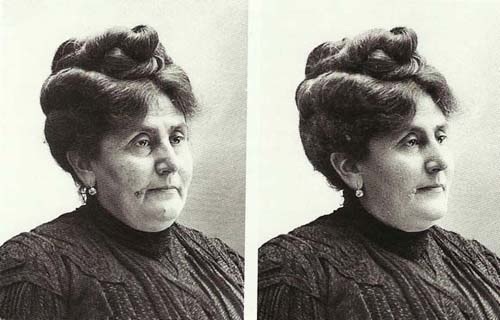
Photo: Paul Nadar | mother of writer Marcel Proust , 1904 ( right photo is retouched )
Nadar was also superb at whittling waists. ;)
 A big thank you Marcelita! In checking out The Proust Society of America (interesting) I found the "Proust Online" site that has the complete text in English and French and other languages. (http://ebooks.adelaide.edu.au/p/prous...)
A big thank you Marcelita! In checking out The Proust Society of America (interesting) I found the "Proust Online" site that has the complete text in English and French and other languages. (http://ebooks.adelaide.edu.au/p/prous...)I've been frustrated in making remarks because I couldn't copy quotes from my ebook on my iPad. This online text can be copied and pasted and is the Scott Moncrieff public domain translation I am reading and listening to.
 Dave wrote: "A big thank you Marcelita! In checking out The Proust Society of America (interesting) I found the "Proust Online" site that has the complete text in English and French and other languages. (http:/..."
Dave wrote: "A big thank you Marcelita! In checking out The Proust Society of America (interesting) I found the "Proust Online" site that has the complete text in English and French and other languages. (http:/..."In 1997, The Proust Society was started in New York, at the Mercantile Library (now, The Center for Fiction) by Harold Augenbraum (now, the Exective Director of the National Book Awards).
There are chapters in Boston, at The Boston Athenaeum (led by Hollie Harder) and in San Francisco, at The Mechanics' Institute Library (led by Mark Calkins). These are all private libraries, so the readers tend to be life-long and passionate Proustians.
New York: History and groups
http://www.centerforfiction.org/readi...
http://www.centerforfiction.org/about...
Boston has two Proust groups:
https://www.bostonathenaeum.org/libra...
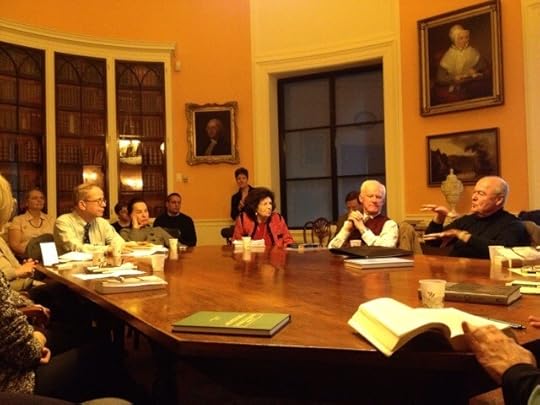
William C. Carter at the Boston Athenaeum
https://www.bostonathenaeum.org/libra...
San Francisco:
http://www.milibrary.org/events/fcbg1...
Another great place to read Proust is at The Providence Athenaeum.
Led by Christina Bevilacqua, we celebrated the 100th Anniversary of "Swann's Way" on November 14, 2014, with a grand dinner.
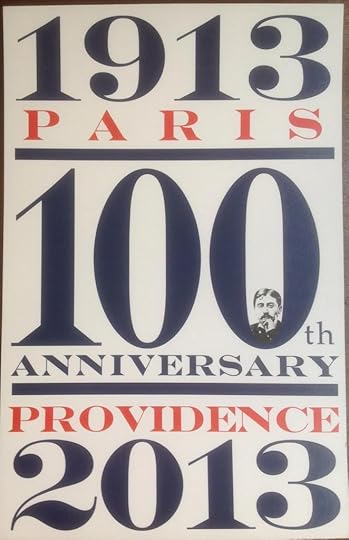
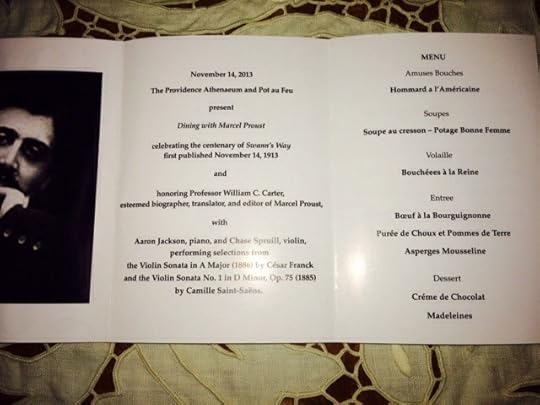
William C. Carter was the guest of honor.
http://www.providenceathenaeum.org/pr...
Yes...it's frustrating trying to "quote," especially,when you don't know where it is...and need to scroll through the text.
Now, if you spoke French, this is a great site!
http://alarecherchedutempsperdu.org
With the English translation...which is terrible, but you can at least find the general location.
http://translate.google.com/translate...
Try and see if this works for you.
Look for #265: "If there was any time quarrels and if one little remained at the Duchess"
It's the end of The Guermantes Way.
Dave, as I'm reading the books in Portuguese, I downloaded free English ebooks versions for when I want to quote something. I just open it on my computer and copy the quote I want.
It's easy to get free ebooks from Goodreads. When you're on a book page, on the "Get a copy" section, you have links for "online stores", "Libraries" and, for some books, the "download ebook" link.
For The Guermantes Way, here's the ebooks page.
It's easy to get free ebooks from Goodreads. When you're on a book page, on the "Get a copy" section, you have links for "online stores", "Libraries" and, for some books, the "download ebook" link.
For The Guermantes Way, here's the ebooks page.
 Thanks again Marcelita. I reviewed the web page of The Center for Fiction. I am encouraged to hear that there are these organizations and lifelong Proustians.
Thanks again Marcelita. I reviewed the web page of The Center for Fiction. I am encouraged to hear that there are these organizations and lifelong Proustians.I am well into the fourth volume and am finding myself increasingly amazed. For the last two days, when I "put down" the book I just sit staring at the page for several minutes in awe. I have thought to myself; this is like walking into what I know to be a very large room in the dark, before dawn, and after waiting for the light for three volumes worth of time, I now realize I am in a great cathedral - and I am in wonder!
I have lots of remarks, but I need to "put" them in the proper week so I don't spoil the experience for others.
 Renato wrote: "Dave, as I'm reading the books in Portuguese, I downloaded free English ebooks versions for when I want to quote something. I just open it on my computer and copy the quote I want.
Renato wrote: "Dave, as I'm reading the books in Portuguese, I downloaded free English ebooks versions for when I want to quote something. I just open it on my computer and copy the quote I want.It's easy to ge..."
Thank you Renato!
Dave, reading your feelings about Vol. 4 makes me even more excited to keep reading the books - as if I needed more incentives, haha!
Please do post your comments on the proper threads and we'll discuss them in the coming weeks! :)
Please do post your comments on the proper threads and we'll discuss them in the coming weeks! :)
 Just wanted to check in and say I'm still with you all and am loving the discussions above.
Just wanted to check in and say I'm still with you all and am loving the discussions above.I loved so many things about the last section, from the celebration of the neurotic, to the illustration of utter isolation around the grandma's decline...
And there was that section about how we often treat our family members with less respect than we show strangers.
 I just discovered this 2014 read-through a week or so ago and have hopped on board and am enjoying it tremendously. Enjoying every ones commentaries and the spoilers don't bother me at all. I really appreciate that no one is posting in French as that happened a lot in the 2013 read-through and made things more difficult and less enjoyable, for this reader at least.
I just discovered this 2014 read-through a week or so ago and have hopped on board and am enjoying it tremendously. Enjoying every ones commentaries and the spoilers don't bother me at all. I really appreciate that no one is posting in French as that happened a lot in the 2013 read-through and made things more difficult and less enjoyable, for this reader at least.
Books mentioned in this topic
Embracing the Ordinary: Lessons From the Champions of Everyday Life (other topics)A Night at the Majestic (other topics)
The 9 Ghosts of Samen's Bane (other topics)
Dreamsbane of Tamalor (other topics)




